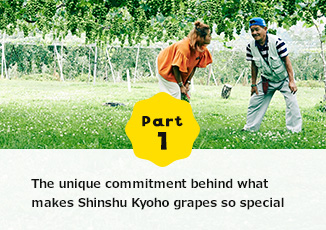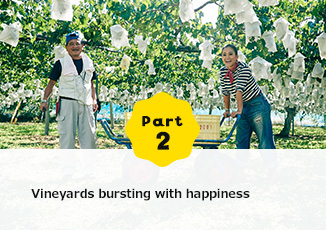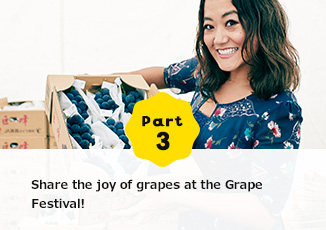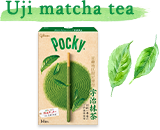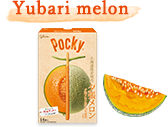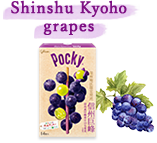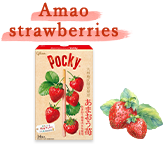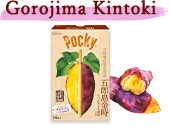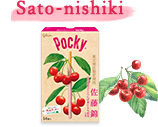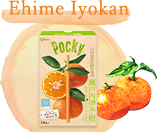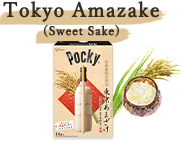Kyoho Grapes, grown with love and care, embark on a journey
The summer has just come to an end.
It is still hot, and you break a sweat just standing around. This is when the Kyoho Grapes fully bear fruit.
This is the time of year that is busiest for farmers, but also the most joyful.
In the previous installment, I visited a farm that showed me the initial steps of production.
Now, in the harvest season, there was a certain din of activity, a bit of tension,
but also relief and joy at seeing that the crop had borne fruit.
They let me join in and help with the final harvest, a day of great happiness.
I met again with this man and his lovely smile.
It was a joy to see how well the fruit had grown!
I visited the same farmer from the last installment.
He was busy as ever, but all smiles as he welcomed me.
The grapes were sheathed in bags to protect the bunches from the sun, rain, and crows. He let me peek inside the bags...
What I found was ripened Kyoho Grapes, a deep purple-black and looking hefty.
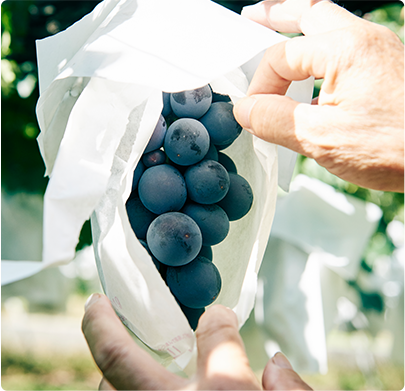
“These are all ripe! Let’s pick them,†he said.
He cut the grapes from the stem, bag on, working his way down the vineyard. They started piling up in the box. I should have known it! This guy works fast!
Keeping the stems a bit longer is done because they will be in supermarkets for some time, so this keeps them in the freshest state for customers to see. This tender loving care is what brings us as consumers grapes that are delicious and fresh.
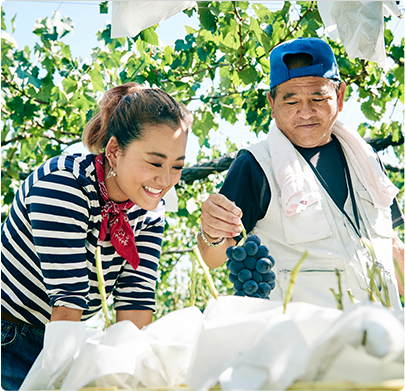
“Bloom†-- a testament to freshness and quality
I grabbed a pair of scissors and helped with the harvest. Leaving a long stem on the bunch, I snipped and snipped. I loved feeling how dense and heavy the bunches were.
My farming buddy worked briskly at my side.
Before long, we had a brimming basket.
The fine white powder on the surface of the Kyoho Grapes is called “bloom.â€
This is a sign of freshness.
Working briskly ensures that the bloom is not lost. Each bunch must be handled like a treasure.
The bloom is like a lovely veil covering the face of a bride setting off to her new family.
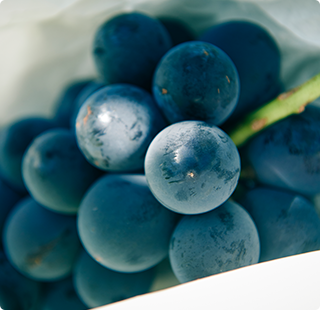
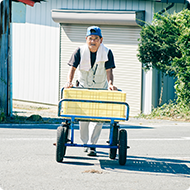
![]()
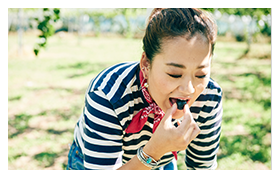
He encouraged me to taste a sample.
I needed no further encouragement. Let’s dig in!
There was a rich bouquet of sweetness and the Kyoho Grape aroma! “Delicious!†I shouted.
They are weighed, then packed.
The whole family helps out
The harvested grapes are immediately carted to a small shed nearby.
Here they are measured and then packed.
His wife and son, who had come back for the summer, deftly work on packing. They work silently and quickly.
The harvest season, arguably the most important time in the year, sees the whole family sending the Kyoho Grapes off to market.
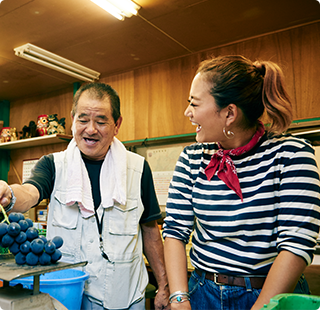
They are measured and adjusted to ensure a uniform size when shipping.
Tiny grapes are removed from the bunch in order to create a uniform look.
The goal is to have each bunch look appealing when it sits on the store shelf.
They even consider which side of the bunch to show facing out when packing them, ensuring that people will be wowed when they look at the package.
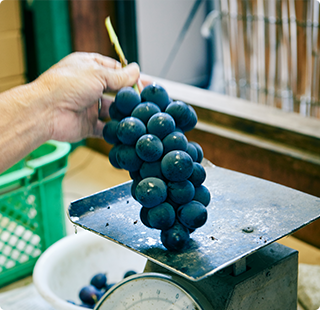
Kyoho Grapes, piled in boxes...
They are ready for their journey.
Once the bunches are neat and orderly, they are gently put in packages and covered in plastic.
The Kyoho Grapes we are used to seeing in stores are in their final form.
م€ŒFRUITS The packages bear a cool logo: “FRUIT HOLLYWOOD.†They also list the farmer’s name, such that it is clear who made them.
Finally, the grapes are ready to go from farm to market! What emotion!
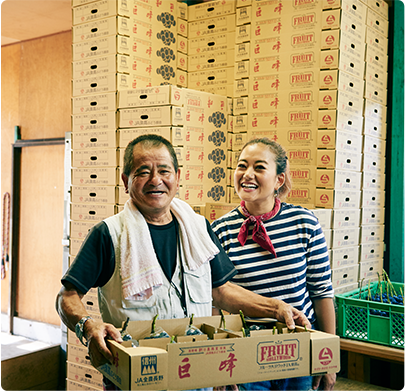
![]()

Jumping for a pose next to the farm!
Being in the vast nature of Shinshu put my energy at the max!
“Elite†confectionery grapes
The grapes destined for the mass market and those for use in sweets are grown on different farms.
I was given a tour of one of the farms on which the Kyoho Grapes used in JIMOTO Pocky are grown.
These are truly an elite group of grapes that will impart the final flavor to sweets.
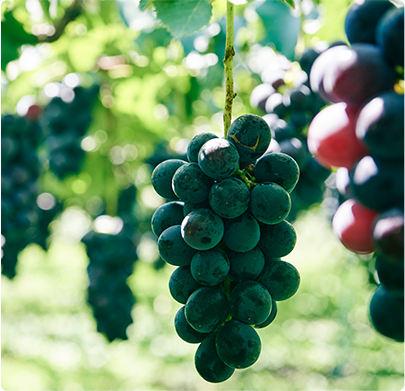
The Kyoho Grapes on this farm are more about size than taste.
Just before the harvest, they all have their bags removed to “thicken†the ripe flavor.
Seeing all of the grapes hanging low is really impressive! I got really amped up.
The grapes are grown and tended to in different ways depending on how they will be used. Finally, it clicked for me!
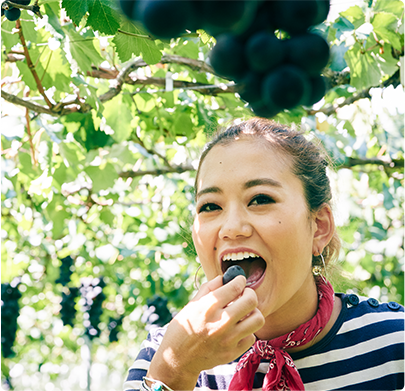
After visiting the farm, I also took a tour of the facilities where the grapes are shipped.
The various grapes harvested at nearby farms come here.
This includes Kyoho Grapes, Nagano Purple, and Shine Muscat, making for a beautiful array of colors all in one place.
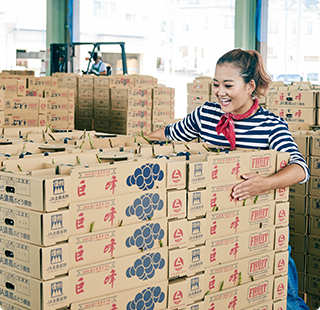
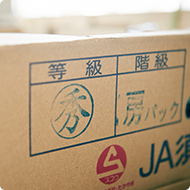

Now they’re ready to board the truck and ship out!
At this site, they do a final check of the grapes that have come in from various points.
They make sure the arrangement on the bunch is orderly and that the color and size are appropriate, ranking them.
The staff here intently look at the grapes with experienced eyes.
They then briskly convey the boxes to the trucks.
This is the final point for the grapes as they are shipped across the country, and there was a solemn air about the proceedings as they expectantly packed them for consumers, such that they arrive fresh.
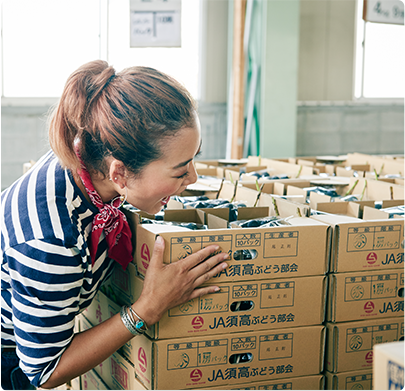
I found the boxes from the farm I visited!
After being thoroughly inspected, they wait to go on the truck.
The grapes will now be shipped across Japan.
I almost want to whisper a wish over the boxes: “May you bring delicious flavor to the consumer!â€
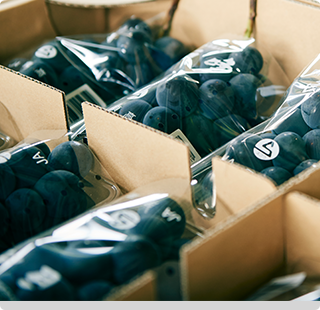
You might say that the waters of Shinshu contribute to that deep sweetness.
They say that Nagano’s land is ideally suited to Kyoho Grapes.
One such factor is the water.
The water flowing through Nagano comes from the Matsukawa River, which gets it source in the Hakuba Valley on the Hida Mountains.
The water has a strong acidic content that, when used to irrigate the farmland, lends grapes and other fruit a sweet taste.
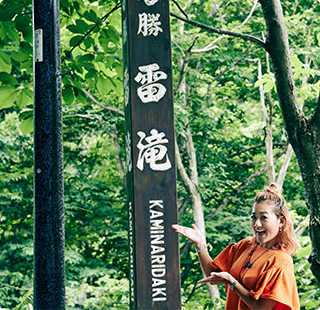
Various natural elements come together in the perfect balance to create a wonderful climate.
I followed the Matsukawa River to its source and made my way through the mountains.
What I found was a vast and impressive waterfall splashing wildly.
This is Kaminari-daki, or the “Thunder Falls.â€
You can even step behind the waterfall, so it is also called the “Falls with Hidden View.â€
The spray of water creates a fine natural mist.
It’s impressive how nature has such power that even human hands cannot replicate.
This power makes the Kyoho Grapes sweet and delicious.
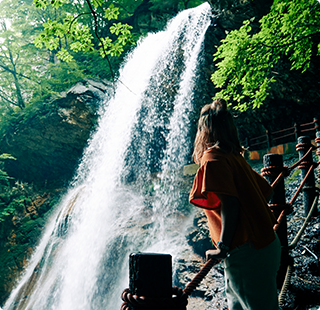

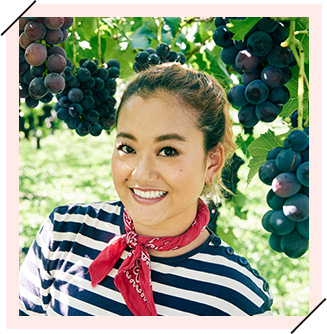
I was truly moved to see the grapes I had tracked thus far go off to shipment!
This report really gave me a sense of the hard work and passion that the growers put into their grapes.
Now, when I find myself in the supermarket, I instinctively check the names of the producers on grapes.














